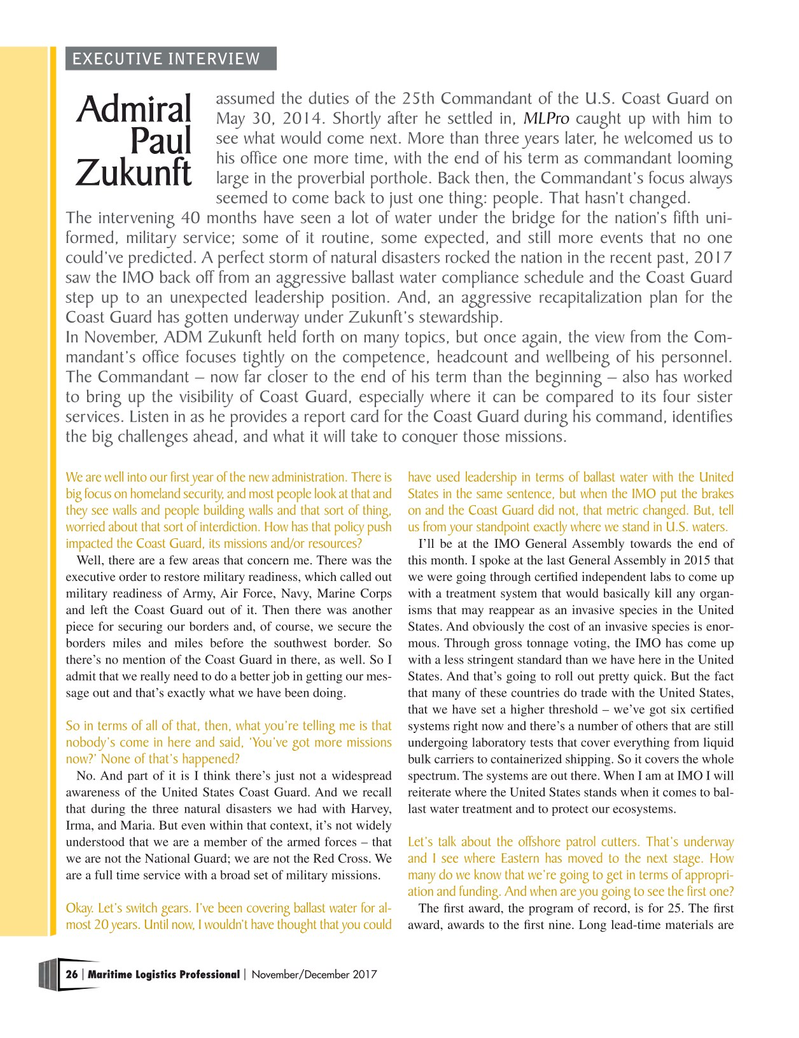
Page 26: of Maritime Logistics Professional Magazine (Nov/Dec 2017)
GREEN PORTS
Read this page in Pdf, Flash or Html5 edition of Nov/Dec 2017 Maritime Logistics Professional Magazine
EXECUTIVE INTERVIEW assumed the duties of the 25th Commandant of the U.S. Coast Guard on
Admiral
May 30, 2014. Shortly after he settled in, caught up with him to
MLPro see what would come next. More than three years later, he welcomed us to
Paul his offce one more time, with the end of his term as commandant looming large in the proverbial porthole. Back then, the Commandant’s focus always
Zukunft seemed to come back to just one thing: people. That hasn’t changed.
The intervening 40 months have seen a lot of water under the bridge for the nation’s ffth uni- formed, military service; some of it routine, some expected, and still more events that no one could’ve predicted. A perfect storm of natural disasters rocked the nation in the recent past, 2017 saw the IMO back off from an aggressive ballast water compliance schedule and the Coast Guard step up to an unexpected leadership position. And, an aggressive recapitalization plan for the
Coast Guard has gotten underway under Zukunft’s stewardship.
In November, ADM Zukunft held forth on many topics, but once again, the view from the Com- mandant’s offce focuses tightly on the competence, headcount and wellbeing of his personnel.
The Commandant – now far closer to the end of his term than the beginning – also has worked to bring up the visibility of Coast Guard, especially where it can be compared to its four sister services. Listen in as he provides a report card for the Coast Guard during his command, identifes the big challenges ahead, and what it will take to conquer those missions.
We are well into our frst year of the new administration. There is have used leadership in terms of ballast water with the United big focus on homeland security, and most people look at that and States in the same sentence, but when the IMO put the brakes they see walls and people building walls and that sort of thing, on and the Coast Guard did not, that metric changed. But, tell worried about that sort of interdiction. How has that policy push us from your standpoint exactly where we stand in U.S. waters.
impacted the Coast Guard, its missions and/or resources?
I’ll be at the IMO General Assembly towards the end of
Well, there are a few areas that concern me. There was the this month. I spoke at the last General Assembly in 2015 that executive order to restore military readiness, which called out we were going through certifed independent labs to come up military readiness of Army, Air Force, Navy, Marine Corps with a treatment system that would basically kill any organ- and left the Coast Guard out of it. Then there was another isms that may reappear as an invasive species in the United piece for securing our borders and, of course, we secure the States. And obviously the cost of an invasive species is enor- borders miles and miles before the southwest border. So mous. Through gross tonnage voting, the IMO has come up there’s no mention of the Coast Guard in there, as well. So I with a less stringent standard than we have here in the United admit that we really need to do a better job in getting our mes- States. And that’s going to roll out pretty quick. But the fact sage out and that’s exactly what we have been doing. that many of these countries do trade with the United States, that we have set a higher threshold – we’ve got six certifed systems right now and there’s a number of others that are still
So in terms of all of that, then, what you’re telling me is that nobody’s come in here and said, ‘You’ve got more missions undergoing laboratory tests that cover everything from liquid now?’ None of that’s happened?
bulk carriers to containerized shipping. So it covers the whole
No. And part of it is I think there’s just not a widespread spectrum. The systems are out there. When I am at IMO I will awareness of the United States Coast Guard. And we recall reiterate where the United States stands when it comes to bal- that during the three natural disasters we had with Harvey, last water treatment and to protect our ecosystems.
Irma, and Maria. But even within that context, it’s not widely understood that we are a member of the armed forces – that Let’s talk about the offshore patrol cutters. That’s underway and I see where Eastern has moved to the next stage. How we are not the National Guard; we are not the Red Cross. We many do we know that we’re going to get in terms of appropri- are a full time service with a broad set of military missions.
ation and funding. And when are you going to see the frst one?
Okay. Let’s switch gears. I’ve been covering ballast water for al- The frst award, the program of record, is for 25. The frst most 20 years. Until now, I wouldn’t have thought that you could award, awards to the frst nine. Long lead-time materials are 26 Maritime Logistics Professional November/December 2017 | |

 25
25

 27
27
